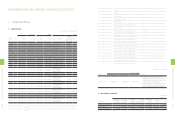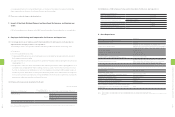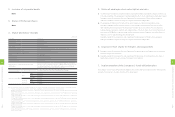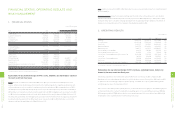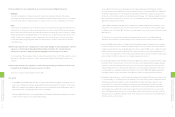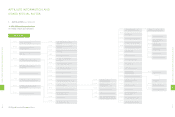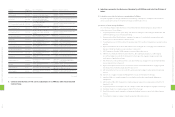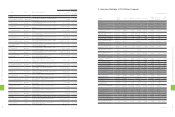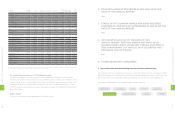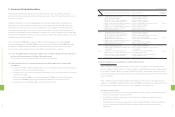HTC 2012 Annual Report Download - page 58
Download and view the complete annual report
Please find page 58 of the 2012 HTC annual report below. You can navigate through the pages in the report by either clicking on the pages listed below, or by using the keyword search tool below to find specific information within the annual report.
As of December 31, 2012, all potential significant difference between IFRSs and current accounting policy
had been identified. Full disclosure of the IFRSs main content and implementation status were included in the
footnote of the 2011 annual consolidated financial statements and the 2012 interim and annual consolidated
financial statements. Starting from 2013, HTC has prepared financial statements in accordance with IFRSs.
The Taiwan "National Health Insurance Act" was amended on January 26, 2011, to create an obligation to fund
the health insurance scheme by paying an eonusxtra 2% "supplementary premium" (based on 2% of the total
profit sharing and variable bonus) plus the basic premium charge. Such extra 2% "supplementary premium" will
be incurred in connection with future payouts of profit sharing and variable bonus and increase the operation
cost of the Company. HTC has studied the implications of this new amendment and has taken the necessary
managerial precautionary steps with respect to such amendment.
(5) Eects on HTC finances of changes in technology and industry trends and response measures
Wireless telecommunications is an important growth sector within the IT industry and the smartphone is its
flagship product. Responding to rapid mobile internet growth and communication technology migration to 3G/4G,
HTC has leveraged outstanding R&D capabilities in partnerships with global telecom leaders to launch numerous
"world firsts" that include the world's first Windows Mobile, Android, dual mode GSM/WiMAX, and LTE Android
mobile phones. The launch of a diverse range of products through many carriers worldwide has built up HTC's
significant position in the global telecommunications industry and created exceptional business opportunities. HTC
will continue to use its resources to develop new technologies and enhance the holistic user experience in order to
deliver products and services that fit market demand.
(6) Eect of changes in the company's corporate image on the company's crisis management protocol
and mitigating measures
HTC maintains high professional ethics and effective control over its operations. Corporate honesty and ethics
rules effectively bar all in the HTC organization from engaging in dishonest or unethical practices.
(7) Anticipated benefits / potential risks related to mergers and acquisitions and mitigating measures
Mergers and acquisitions in recent years have focused on raising overall product value and enriching the
HTC user experience. All such activities have been funded internally. Future mergers and acquisitions will be
conducted after careful consideration of expected benefits and in accordance with all relevant government laws
and corporate regulations.
(8) Anticipated benefits / potential risks of HTC plant expansion plans and mitigating measures
In response to global market demand for smartphone devices, in addition to the continuous review and
improvement of manufacturing processes to improve production capabilities, quality, and cost savings, HTC's
Taipei headquarters was completed in June of 2012. In April of that year the new Taoyuan plant officially began
mass production, in order to keep pace with market conditions and to take into account the growth of the talent
pool, capacity expansion, and flexible production configurations.
Inflation in Taiwan was approximately 1.9% in 2012. Inflation rates in North American and European markets were
also relatively negligible. Overall, inflation had no significant impact on HTC profits.
(2) Risks associated with high-risk/high-leveraged investment; lending, endorsements, guarantees for
other parties and financial derivative transactions
HTC does not engage in high-risk ventures or highly leveraged investments. Loaning of funds takes place only
between HTC subsidiaries. All such arrangements must be reviewed and approved by the board of directors in
accordance with the Operational Procedures for Fund Lending and Rules for Endorsements and Guarantees.
HTC engages in derivative products trading only to mitigate forex risks arising from foreign currency assets and
liabilities. All derivative trading is conducted according to stipulations written in the Procedures for Acquisition
or Disposal of Assets.
(3) Future R&D plans and anticipated R&D expenditures
The Company's R&D programs for the most recent fiscal year primarily focus on research and development of
applications related to the user experience and mobile data services, and on providing product-related technical
support and after-sales service.
In addition to further developing its existing smartphone product line, the Company will continue to research
and develop technologies that enhance the user experience, such as wide-angle front camera technologies
that allow users to have an ever-more perfect self-shooting experience by enabling the lens to image a broader
background, and high efficiency, low distortion headphone amplifiers and built-in speakers whose sound is even
more stunning. HTC is also exploring dual card, dual mode capabilities that permit dual card users to answer
incoming calls whether surfing the Internet or downloading information, while the phone smoothly juggles all the
necessary systems. Through HTC's advanced technologies users will continue to enjoy richer, more personalized
mobile phone experiences.
Since its founding, HTC has poured resources into fostering research and development talent and into
technological innovation. At present R&D personnel account for 30% of HTC's employees worldwide, while
investment in R&D resources equals 4-5% of operating income. In the future, HTC will continue to break new
ground in the smart handheld device industry and further streamline the user experience in order to strengthen
the company's long-term competitiveness.
(4) Eects of domestic / foreign government policies and regulations on HTC finances and response
measures
The Financial Supervisory Committee (FSC) of the Executive Yuan has required all listed companies in Taiwan to
prepare financial statements in accordance with the International Financial Reporting Standards (IFRSs) starting
from January 1, 2013. HTC has established an IFRSs project team and has launched the project plan for its IFRSs
adoption. In addition, the progress of such adoption is regularly reported to the Board.
1
1
2
6
FINANCIAL STATUS, OPERATING
RESULTS AND RISK MANAGEMENT
1
1
3
6
FINANCIAL STATUS, OPERATING
RESULTS AND RISK MANAGEMENT




